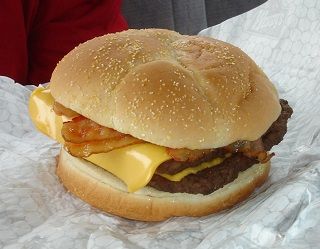OK, Quick — What's the REAL Obstacle to Halting Climate Change?

When I came across this article called The Real Obstacle to Halting Climate Change, I characteristically took a guess. “OK, this is TruthDig, a progressive news source, so I’m going to say it’s essentially man’s inhumanity to man, the fact that we’re a fat, dumb, corrupt and selfish civilization.”
I would have been close, but wrong.
According to the author, it’s our fondness for meat. The article does a good job at explaining the enormous drain on resources that is involved with the raising and slaughtering of cows, pigs, etc. In addition to the food, water, processing and transportation, we have, of course, the clearing of the forests – lands that once functioned as lush, green habitat for biodiversity as well as a huge sink for carbon dioxide.
Obviously, there are also health-related reasons to cut back on meat, for those who may be looking for an extra incentive. I’m reminded of the bumper-sticker I saw a while back: “Beef: It’s What’s Rotting in Your Colon.”

Sigh.
As a dedicated carnivore, I object.
The average adult in America should have a calorie intake of ~2000-2500 calories/day. Instead, we typically eat ~2500-3000 calories a day, and we’re getting fatter. That’s too bad. but a simple conversion shows this to be ~3-3.5 kWh of energy being noshed by the average American.
But the average American burns 2 gallons of gasoline (72 kWh) per day in transportation. The production and distribution of is ~88% efficient, so this works out to ~82 kWh worth of energy required to transport us around.
We Americans used ~35 kWh/day of electricity between home, work, and leisure. The average fossil electricity on the grid is ~34% efficient, so this works out to ~103 kWh worth of energy to satisfy our lifestyle.
We eat ~3 kWh, we drive ~82 kWh, and we live, work and play in ~103 kWh…
Yes eating meat is more energy intensive than eating salad, and yes animals fart… but in the grand scheme of things this is NOT the bigger issue.
I’ve taken this up here: http://2greenenergy.com/2013/05/13/energy-water-and-land-use/. Please tell me what you think. Thanks.